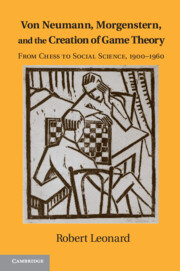Book contents
- Frontmatter
- Contents
- Acknowledgments
- Von Neumann, Morgenstern, and the Creation of Game Theory
- Introduction
- Part One Struggle and Equilibrium: from Lasker to von Neumann
- Part Two Oskar Morgenstern and Interwar Vienna
- 5 Equilibrium on Trial
- 6 Wrestling with Complexity
- 7 Ethics and the Excluded Middle
- 8 From Austroliberalism to Anschluss
- Part Three From War to Cold War
- Bibliography
- Index
- Plate section
8 - From Austroliberalism to Anschluss
Morgenstern and the Viennese Economists in the 1930s
Published online by Cambridge University Press: 05 December 2013
- Frontmatter
- Contents
- Acknowledgments
- Von Neumann, Morgenstern, and the Creation of Game Theory
- Introduction
- Part One Struggle and Equilibrium: from Lasker to von Neumann
- Part Two Oskar Morgenstern and Interwar Vienna
- 5 Equilibrium on Trial
- 6 Wrestling with Complexity
- 7 Ethics and the Excluded Middle
- 8 From Austroliberalism to Anschluss
- Part Three From War to Cold War
- Bibliography
- Index
- Plate section
Summary
Introduction
One autumn evening in 1927, Karl Menger gave a talk to the collected members of the Vienna Economics Society, the group rehabilitated by Hayek. Amongst them, those close to Ludwig von Mises as leader of the Austro liberals included Hayek, Fritz Machlup, Gottfried Haberler, and Richard Strigl. Somewhat apart from this nucleus, closer to Mayer, stood Paul Rosenstein-Rodan, Alexander Gerschenkron, and Morgenstern himself. Other figures worth noting include Steffie Braun, one of the few women in this male-dominated group; Richard Schüller, the senior civil servant; economist Ewald Schams; and members of the business community, such as banker Karl Schlesinger and Menger's friend Felix Kaufmann, a philosopher of law and social science who worked for a petroleum company.
As mathematician and scion of Vienna's most distinguished economics family, Menger was comfortable with the two communities. That evening in 1927, he was not long back in Vienna, after his acrimonious sojourn in Amsterdam with Brouwer. As protégé of Hans Hahn, Menger the student was close to the mathematicians and philosophers of the Schlick Kreis, or Vienna Circle, which included, in addition to Hahn himself, Moritz Schlick, Rudolf Carnap, and Otto Neurath. These figures were well known to the liberal economists such as Mises. In particular, Otto Neurath long had been an opponent of Mises, beginning in Böhm-Bawerk's famous seminar at the University, which also included socialist Otto Bauer, and continuing in the 1920s when Neurath was a key target in Mises’ anti-socialist writings.
- Type
- Chapter
- Information
- Von Neumann, Morgenstern, and the Creation of Game TheoryFrom Chess to Social Science, 1900–1960, pp. 140 - 182Publisher: Cambridge University PressPrint publication year: 2010

